Key takeaways:
- Political impersonations serve as a reflective tool, revealing societal sentiments and highlighting political flaws through humor.
- Historically, impersonations have evolved from ancient satire to modern television, engaging audiences and fostering public discourse.
- Impersonations can unify and divide audiences, provoking important conversations while also risking alienation for some individuals.
- The future of political impersonation may be shaped by technology and interactivity, raising questions about authenticity and ethical implications.
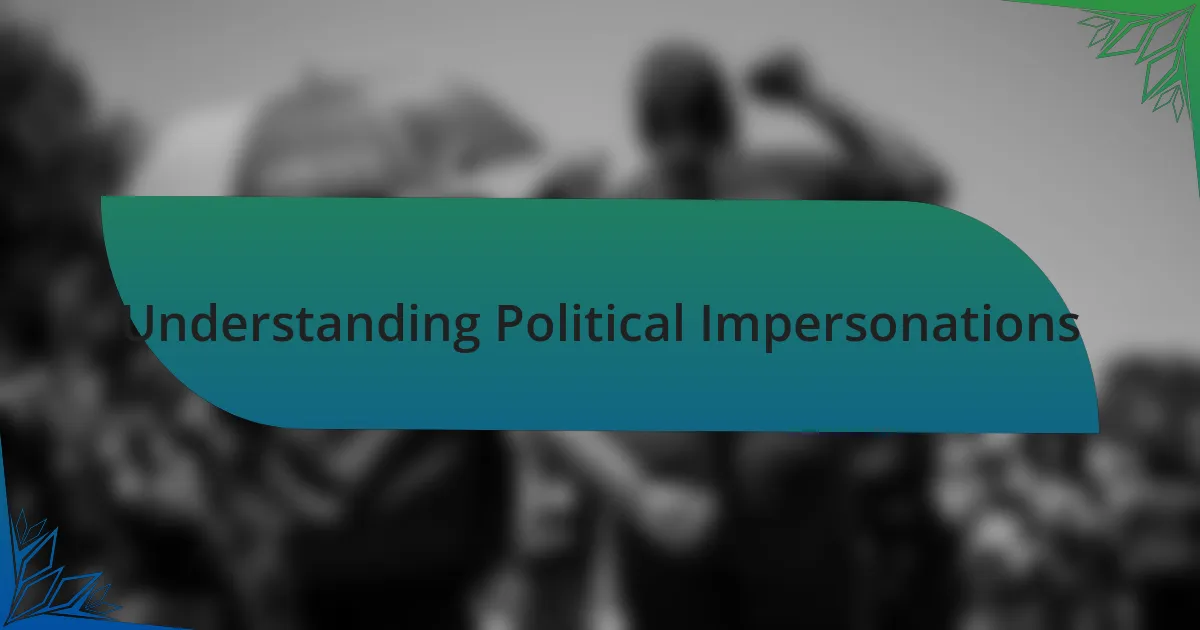
Understanding Political Impersonations
Political impersonations serve as a fascinating lens through which we can examine both the subjects being impersonated and the society that engages with them. I remember watching a late-night show where the impersonator perfectly captured a particular politician’s mannerisms and quirks. It struck me how these performances can reveal deeper truths about public sentiment and the politician’s persona.
These impersonations often exaggerate certain traits to highlight flaws or contradictions, provoking both laughter and reflection. I sometimes wonder, how much of an impact does this satire have on our political understanding? In my experience, a well-executed impersonation can spark conversations that go beyond humor, making us reconsider our views on the political landscape.
Moreover, the emotional connection viewers have with these impersonations cannot be understated. When I see an impersonation that resonates with my frustrations or hopes, it feels validating, almost like finding a voice for my own feelings. Isn’t it interesting how comedy can become a powerful tool for political commentary, pushing us to confront uncomfortable truths while we laugh?

Importance of Political Commentary
Political commentary plays an essential role in shaping public discourse. When I think back to pivotal moments in politics, it’s often the satirical takes that resonate most clearly with my own views. For instance, a well-timed parody can bring to light the absurdities of political decisions, making complex issues more relatable and digestible.
Moreover, it serves as a vital check on power. I recall a time when a particular impersonation illuminated the discrepancies in a politician’s promises versus their actions, prompting me to critically evaluate their leadership. Isn’t it fascinating how these performances can not only entertain but also inform, encouraging citizens to hold their leaders accountable?
Finally, the emotional weight of political commentary often drives change. There have been countless instances when a clever impersonation captured the mood of the nation, rallying people around a cause. Isn’t it true that humor can be the spark that ignites our passion for civic engagement? When I observe people sharing these sketches on social media, it feels like a collective awakening, urging us to participate more actively in shaping our political landscape.
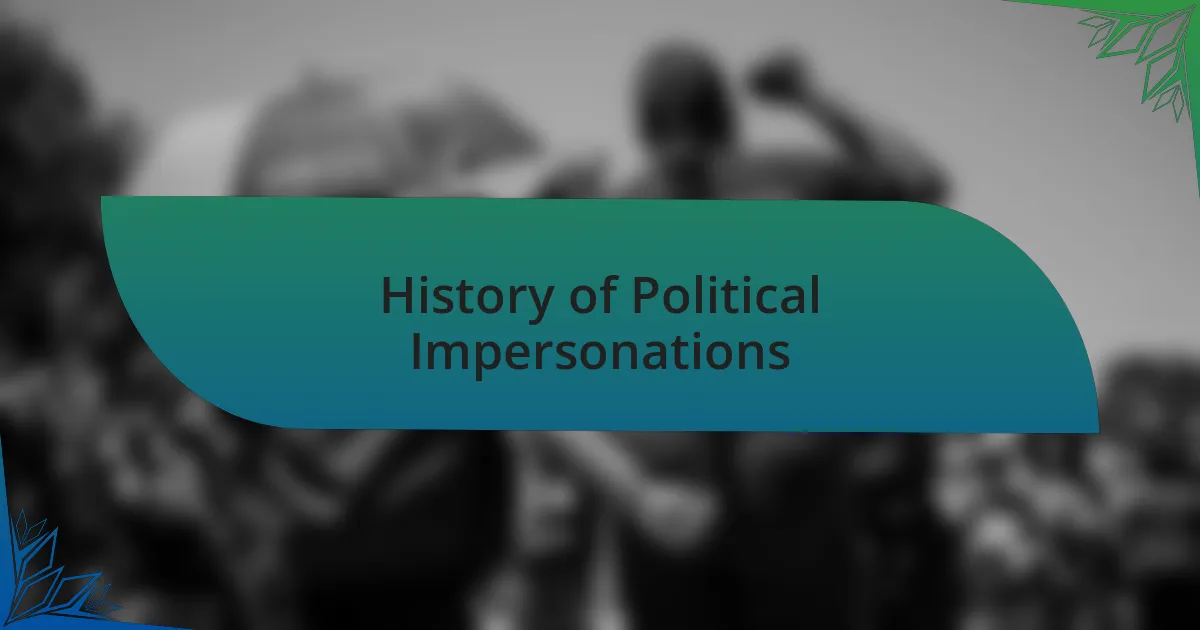
History of Political Impersonations
Political impersonations have a rich history dating back to ancient Greece, where satirical performances often criticized public figures. I’ve always found it interesting how these early forms of comedic critique set the stage for modern impersonations, which still serve to highlight the flaws and follies of our leaders. The idea of using humor to provoke thought about serious issues is as timeless as politics itself.
During the 18th and 19th centuries, caricatures became a popular medium, illustrating the absurdities of political figures in newspapers and pamphlets. I can’t help but admire how artists like James Gillray used humor to challenge the status quo, making critiques accessible to a broader audience. Have you ever noticed how a powerful caricature can spark conversations at the dinner table?
The rise of television in the 20th century transformed political impersonations, giving comedians like Jay Leno and Saturday Night Live’s cast a platform to reach millions. Reflecting on how those sketches shaped public perception, I remember laughing along while also questioning the motives behind political actions. Isn’t it fascinating how a simple impersonation can stimulate such a profound dialogue about leadership and governance?
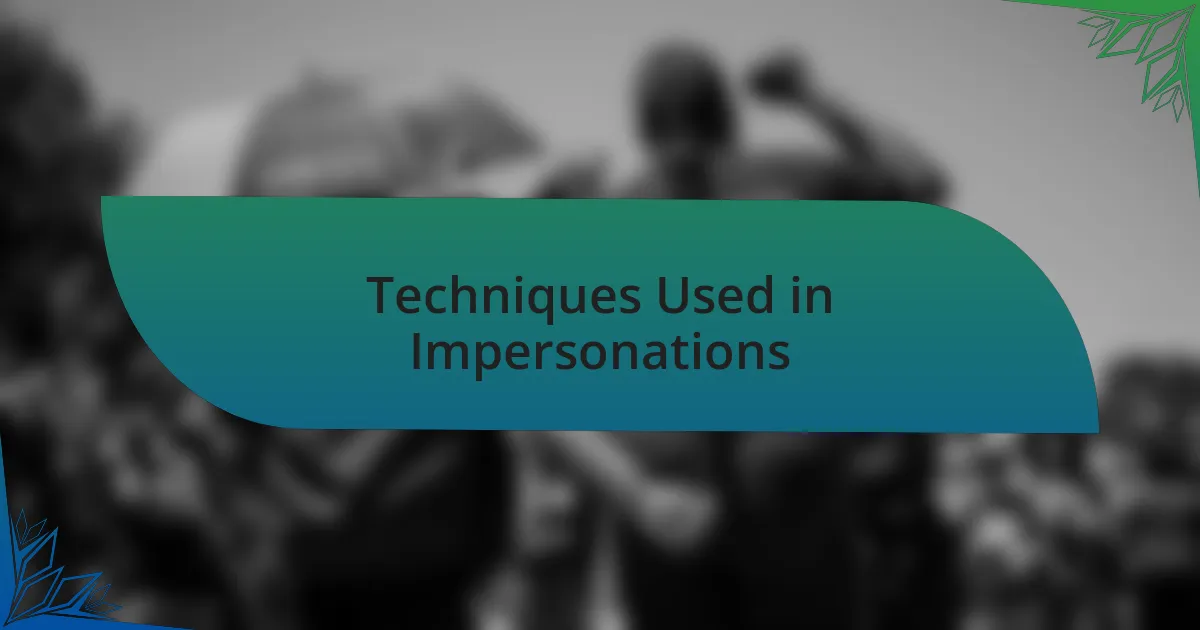
Techniques Used in Impersonations
Impersonators often rely on vocal mimicry to capture the essence of their subjects. I’ve watched talented performers nail the distinct speech patterns and quirks of various politicians, which often makes the portrayal feel both intimate and relatable. Have you ever found yourself laughing at a moment that felt eerily accurate, almost as if the impersonator were truly channeling the politician’s spirit?
Physicality is another key technique used in impersonations. The way a performer moves or gestures can be just as important as their voice. I remember seeing a skit where the impersonator exaggerated a politician’s characteristic stance, and it was astonishing how a simple gesture made the entire act resonate more deeply. Isn’t it interesting how our bodies can convey so much about our personalities, especially in a political context?
Costumes and props also play a vital role in making impersonations memorable. I often think about how a well-chosen outfit can instantly transform a performer into their character, adding layers of humor and recognition. When a comedian steps onto the stage wearing a signature tie or hat, it’s almost like they’re signaling to the audience: “Get ready for a ride!” Have you experienced that delightful moment when a simple costume change evokes a flood of familiarity and laughter?
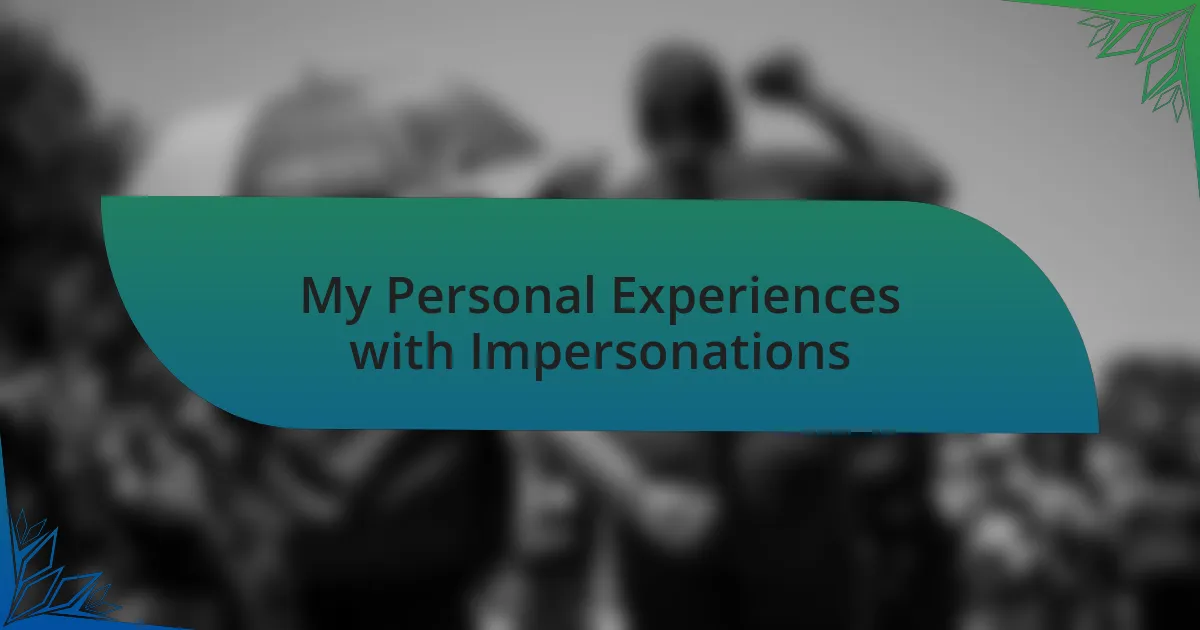
My Personal Experiences with Impersonations
I still vividly recall the first time I saw an impersonation that truly resonated with me. It was during a political satire show, and the performer captured not just the voice of the politician but also their essence. I was struck by how my friends and I shared knowing glances during those moments; it was as if the impersonator not only entertained us but also helped us process our own feelings about the politician’s actions, making the experience more reflective than just a simple laugh.
On another occasion, I attended a live comedy night where an impersonator went beyond just mimicry. They punctuated their act with clever anecdotes that mirrored real political events. I found myself laughing uncontrollably when the impersonator enacted a recent debate; it was a mix of humor and discomfort as they exaggerated the absurdity of the moment. Isn’t it fascinating how laughter can sometimes be a coping mechanism for the frustrations we feel toward political scenarios?
One experience that stands out involved a friend who was a huge fan of a particular politician. I watched helplessly as they reacted with actual anger during an impersonation that poked fun at that politician. It made me realize how deeply personal and emotional these impersonations can be. Can humor and criticism coexist so close together? In that instance, it became clear that impersonations hold power, capable of both uniting and dividing opinions in an instant.
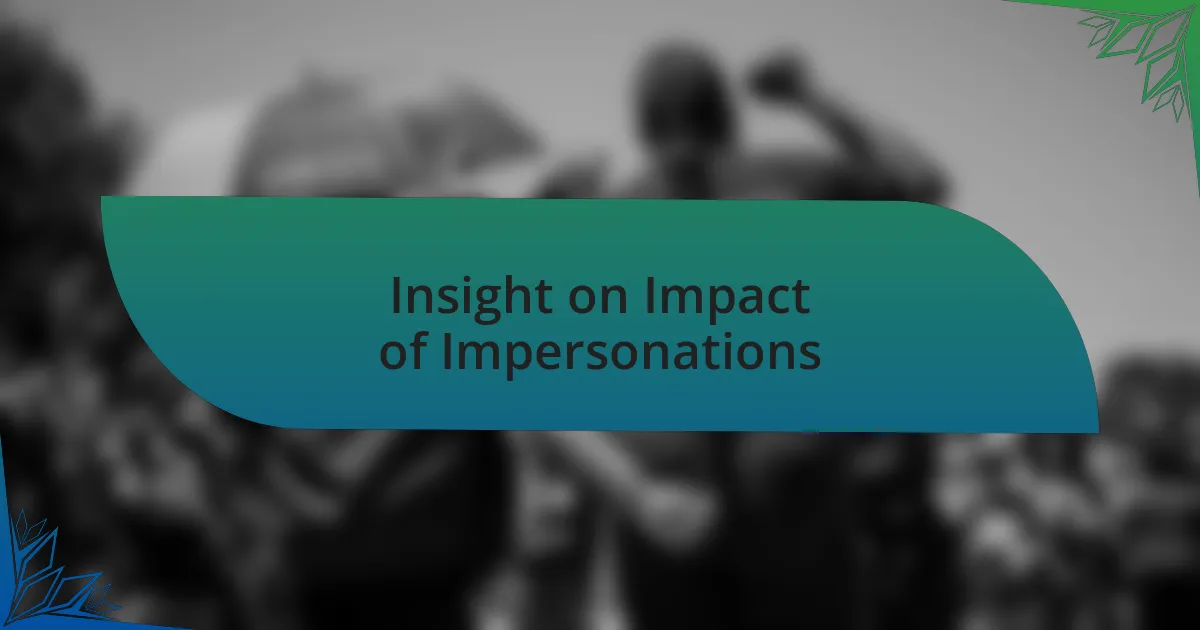
Insight on Impact of Impersonations
Impersonations can serve as a powerful lens through which we view political figures and their policies. I remember watching a late-night show where the host impersonated a controversial leader. It struck me how the laughter transformed into a collective sigh of relief—people felt seen and heard. But why does humor often reveal our deepest frustrations? I think it’s because it allows us to confront the absurdity of politics in a way that feels safer.
During another performance, the impersonator tackled sensitive issues head-on, using wit to illuminate societal problems without directly attacking anyone. The audience responded with a mix of laughter and nods, creating an atmosphere where we could reflect on serious topics together. This shared experience made me think: do impersonations help bridge the gap between disillusionment and understanding? It seems they can foster a kind of community, bringing individuals together over shared frustrations and insights.
Yet, not everyone responds positively to impersonations. I recall a heated discussion with friends after a particularly biting impersonation. Some found it hilarious, while others felt it was too harsh, even harmful. This divide made me realize that while impersonations can generate important dialogue, they can also alienate those who feel mocked or misunderstood. It’s an intriguing paradox, isn’t it? Humor walks a fine line between connecting us and pushing us apart.
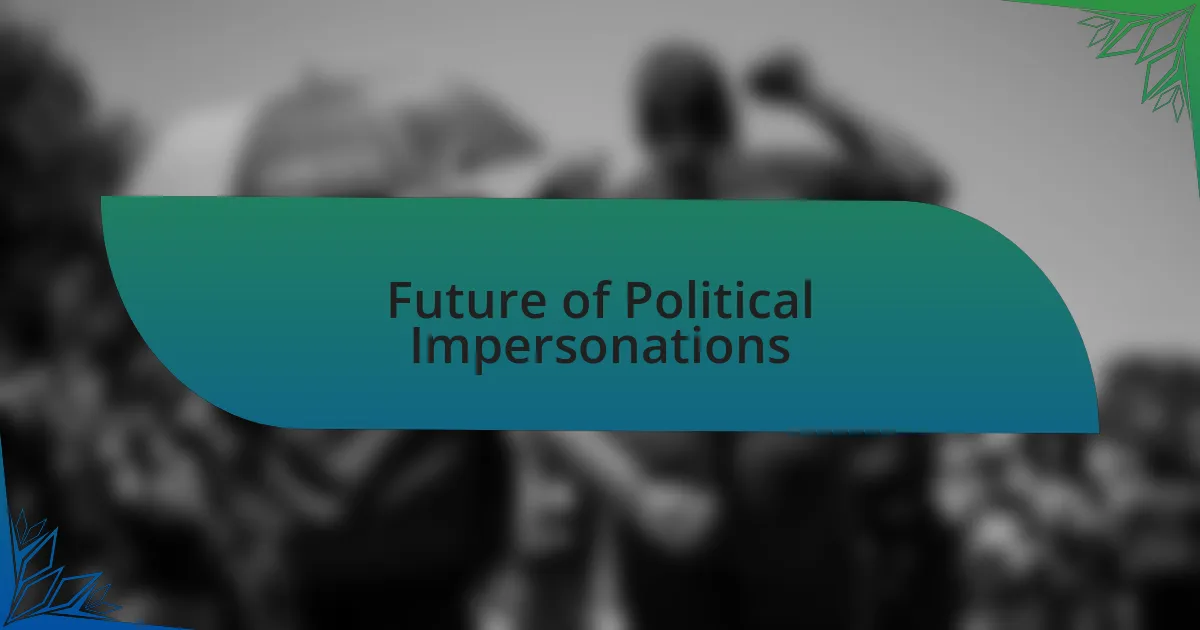
Future of Political Impersonations
As I ponder the future of political impersonations, I can’t help but think about how technology will continue to shape this art form. With the rise of social media platforms, I often see satirical snippets go viral almost overnight. Isn’t it fascinating how a single impersonation can spark conversations across different demographics? This accessibility may lead to new voices emerging in the world of satire, ensuring a spectrum of perspectives that can both entertain and provoke thought.
Looking ahead, I wonder if we’ll see a shift towards more interactive forms of impersonation. Live virtual performances, combined with audience involvement, could create a new dynamic that makes us rethink how we engage with political commentary. I recently experienced an online event where viewers voted in real-time on topics for impersonation. This engaging element made me feel like part of the show, amplifying the impact of the humor. Will this be the norm in the future, allowing us to guide the narrative as a community?
Moreover, I’m curious about the ethical implications as technology evolves. With the potential for deepfakes, how do we maintain authenticity in a world where the line between reality and parody blurs? Personally, the thought of manipulated impersonations makes me uneasy. I believe it’s crucial to preserve the essence of satire while being mindful of its impact. Can political impersonation continue to be a force for good if we navigate these challenges carefully?